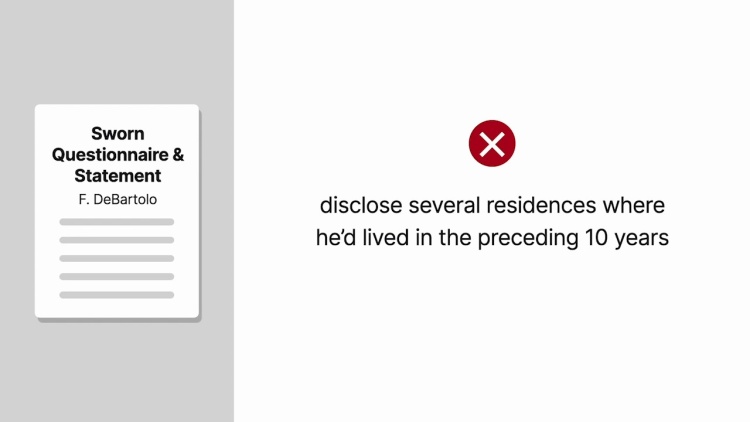In re DeBartolo
Illinois Supreme Court
488 N.E.2d 947, 111 Ill.2d 1, 94 Ill.Dec. 700 (1986)
- Written by Samantha Arena, JD
Facts
Frederick Francis DeBartolo (plaintiff) applied for admission to the Illinois state bar. In the “Questionnaire and Statement of Applicant” DeBartolo submitted to the Committee on Character and Fitness for the First Judicial District (defendant), DeBartolo presented various facts inaccurately. Specifically, DeBartolo indicated the wrong location and date of his high school attendance, and failed to list numerous residential addresses at which he lived in the years prior to applying. DeBartolo indicated on his application that, during his time in law school, he accumulated between 200 and 400 parking tickets, but that he either paid or successfully contested all of them. The committee refused to certify to the State Board of Law Examiners that DeBartolo possessed the good moral character and general fitness necessary for the practice of law. DeBartolo requested a hearing on the committee’s decision. At the hearing, DeBartolo offered no justification for the discrepancies in his high school attendance information. Further, evidence was submitted to show that DeBartolo had a history of misrepresenting himself as a police officer. It was also established that DeBartolo had not reported residential addresses at which he registered to vote and that he used in applying for a number of documents, including a driver’s license. Although friends and relatives testified to DeBartolo’s fitness to practice law, the committee ultimately voted to refuse to certify his character and fitness. DeBartolo filed a petition in the Supreme Court of Illinois contesting the Committee’s refusal.
Rule of Law
Issue
Holding and Reasoning (Miller, J.)
What to do next…
Here's why 907,000 law students have relied on our case briefs:
- Written by law professors and practitioners, not other law students. 47,100 briefs, keyed to 996 casebooks. Top-notch customer support.
- The right amount of information, includes the facts, issues, rule of law, holding and reasoning, and any concurrences and dissents.
- Access in your classes, works on your mobile and tablet. Massive library of related video lessons and high quality multiple-choice questions.
- Easy to use, uniform format for every case brief. Written in plain English, not in legalese. Our briefs summarize and simplify; they don’t just repeat the court’s language.





